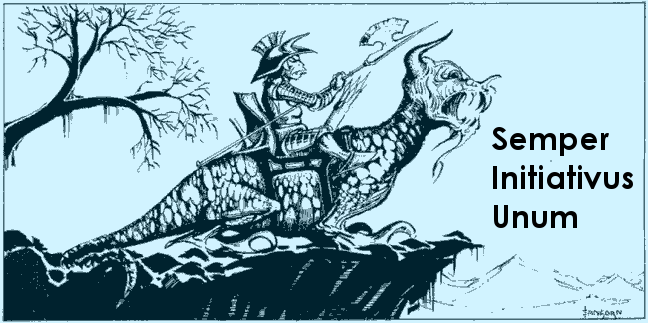When I asked Mike about Diplomacy, he responded with this:
I played a bit of Diplomacy. More importantly, though, Gary and some of the others played a LOT. It shows in the role playing system of OD&D. There are those who say "there was no role playing in OD&D because there are no rules for DIPLOMACY or BLUFF or INTIMIDATE," etc. But in fact it was full of role playing and negotiation, just like Diplomacy. And like Diplomacy, if you wanted to Bluff, you BLUFFED. If you wanted to make a deal, you MADE A DEAL. Et cetera.Later in the thread, he describes Gygax's NPCs:
Pretty much everybody. If you search online you can find Gary's story "The Magician's Ring." "Lessnard" is me, and yeah, that happened. That was pretty typical... his NPCs were greedy and opportunisitc to a fault.You can find "The Magician's Ring" at Greyhawk Grognard, and it's as Mike describes. Now, I want to posit that the two quotes above are intimately linked. Diplomacy is a game that is infamous for its maneuvering and treachery, where making deals and then stabbing a partner in the back are the best strategy to win.
Then you had more mundane stuff like blacksmiths covering swords with luminous paint and selling them as magic swords, and "angry villagers" keeping you from getting your money back.
Truthfully, his NPCs went beyond "will screw you if it profits them" to "will screw you unless not doing so profits them a lot."
When you consider that many of the pioneering roleplayers were Diplomacy players, their style of roleplaying becomes much clearer. As I said in my last post, negotiation is a key aspect of dungeoneering in early editions as written, but was all too often overlooked in favor of the expedient of simply fighting.
The best evidence of this is B2 Keep on the Borderlands. Here is a scenario right out of the many Diplomacy variants: each humanoid group has its forces, every group can pretty easily kill the PCs, but with careful negotiation they can play one against the other. You could run an interesting Diplomacy-type game where each player takes the role of one of the faction leaders and tries to take on the other groups. There's also the cleric and his followers, who go along with the "backstabbing hireling" motif that we saw in "The Magician's Ring."
There's a tendency, particularly in America, to see diplomacy as something "soft," something you resort to when you can't get your way by brute force. Gygax had a keen sense for it, though, and understood it much better. I'm reminded of a podcast where Dan Carlin talked about how the ancient Romans viewed diplomacy as an offensive weapon. Done properly, you can disorient or even eliminate enemies without fighting them yourself.
I think this view of roleplaying has a lot to offer. If you play old school D&D as written, with the reaction table and hireling loyalty and so on, elements of it will come out naturally. And it offers a fun, playable alternative to people who think of role-playing primarily in terms of melodramatic play-acting.


